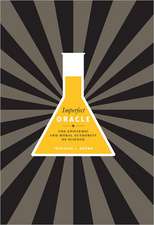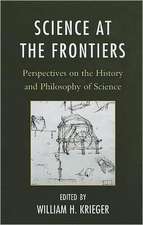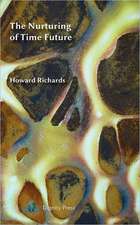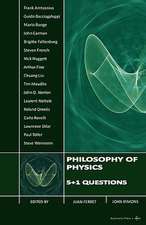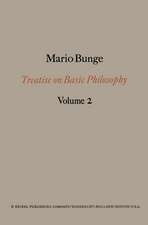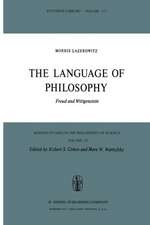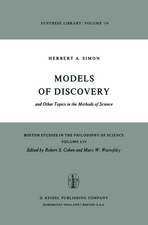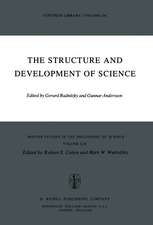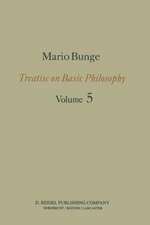Thomas Kuhn's Revolutions: A Historical and an Evolutionary Philosophy of Science?
Autor James A. Marcumen Limba Engleză Paperback – 21 oct 2015
| Toate formatele și edițiile | Preț | Express |
|---|---|---|
| Paperback (1) | 181.77 lei 6-8 săpt. | |
| Bloomsbury Publishing – 21 oct 2015 | 181.77 lei 6-8 săpt. | |
| Hardback (1) | 570.51 lei 6-8 săpt. | |
| Bloomsbury Publishing – 21 oct 2015 | 570.51 lei 6-8 săpt. |
Preț: 181.77 lei
Preț vechi: 209.44 lei
-13% Nou
Puncte Express: 273
Preț estimativ în valută:
34.79€ • 36.18$ • 28.72£
34.79€ • 36.18$ • 28.72£
Carte tipărită la comandă
Livrare economică 15-29 aprilie
Preluare comenzi: 021 569.72.76
Specificații
ISBN-13: 9781472530493
ISBN-10: 1472530497
Pagini: 304
Dimensiuni: 156 x 234 x 18 mm
Greutate: 0.5 kg
Editura: Bloomsbury Publishing
Colecția Bloomsbury Academic
Locul publicării:London, United Kingdom
ISBN-10: 1472530497
Pagini: 304
Dimensiuni: 156 x 234 x 18 mm
Greutate: 0.5 kg
Editura: Bloomsbury Publishing
Colecția Bloomsbury Academic
Locul publicării:London, United Kingdom
Caracteristici
Includes new chapters exploring Kuhn's shift from a historical to an evolutionary philosophy of science, his legacy and the future of Kuhnian studies
Notă biografică
James Marcum teaches philosophy at Baylor University, USA. He has doctorates in philosophy and physiology, and was a postdoctoral fellow at MIT, where he studied philosophy of science with Kuhn. He was also an Assistant Professor at Harvard Medical School, USA.
Cuprins
Acknowledgments Preface Part I. The Road to Structure 1. Who is Kuhn? 2. How does Kuhn arrive at Structure? Part II. Kuhn's Historical Philosophy of Science3. What is The Structure of Scientific Revolutions? 4. Why does Kuhn revise Structure? Part III. Kuhn's Paradigm Shift5. What is Kuhn up to after Structure? 6. What is Kuhn's Evolutionary Philosophy of Science?Part IV. Kuhn's Impact and Legacy7. What is Kuhn's Impact on and Legacy to the History and Philosophy of Science and to the Natural Sciences?8. What is Kuhn's Impact on and Legacy to the Behavioral, Social, and Political Sciences and to the Fine Arts?Epilogue EndnotesBibliography Index
Recenzii
A valuable resource for Kuhn scholars and all those interested specifically in a contextualization of Structure of Scientific Revolutions or searching for a comprehensive overview of the secondary literature on Kuhn in philosophy and beyond.
Marcum has masterfully captured Kuhn's contributions to philosophy and history of science with useful biographical information, insightful interpretations, and resourceful selection of the vast secondary literature on Kuhn and the wide impact of his thinking. Simply, Thomas Kuhn's Revolutions is a noteworthy study and will serve as one of the key texts for placing Kuhn in his intellectual context.
Thomas Kuhn's The Structure of Scientific Revolutions is the most important work in the philosophy of science in the twentieth century. James Marcum's is simply the best book that has ever been written on Kuhn's thinking, both in Structure and in writings before and after. It is fair-minded, clearly written, comprehensive, and with enough of a critical edge that you want to go on studying Kuhn and seeing how he still applies to issues that concern us. This is the book we have been waiting for.
Kuhn's Structure is a modern classic and yet its genesis has not so far had the attention it deserves. James Marcum's book fulfils magnificently this lacuna giving us not only the rich details of how the book came to be written but also its intellectual and wider contributions, its impact and the criticism it received. The author's personal connection to Kuhn and the focus on Kuhn's personality make the reading all the more enjoyable.
Marcum has masterfully captured Kuhn's contributions to philosophy and history of science with useful biographical information, insightful interpretations, and resourceful selection of the vast secondary literature on Kuhn and the wide impact of his thinking. Simply, Thomas Kuhn's Revolutions is a noteworthy study and will serve as one of the key texts for placing Kuhn in his intellectual context.
Thomas Kuhn's The Structure of Scientific Revolutions is the most important work in the philosophy of science in the twentieth century. James Marcum's is simply the best book that has ever been written on Kuhn's thinking, both in Structure and in writings before and after. It is fair-minded, clearly written, comprehensive, and with enough of a critical edge that you want to go on studying Kuhn and seeing how he still applies to issues that concern us. This is the book we have been waiting for.
Kuhn's Structure is a modern classic and yet its genesis has not so far had the attention it deserves. James Marcum's book fulfils magnificently this lacuna giving us not only the rich details of how the book came to be written but also its intellectual and wider contributions, its impact and the criticism it received. The author's personal connection to Kuhn and the focus on Kuhn's personality make the reading all the more enjoyable.

